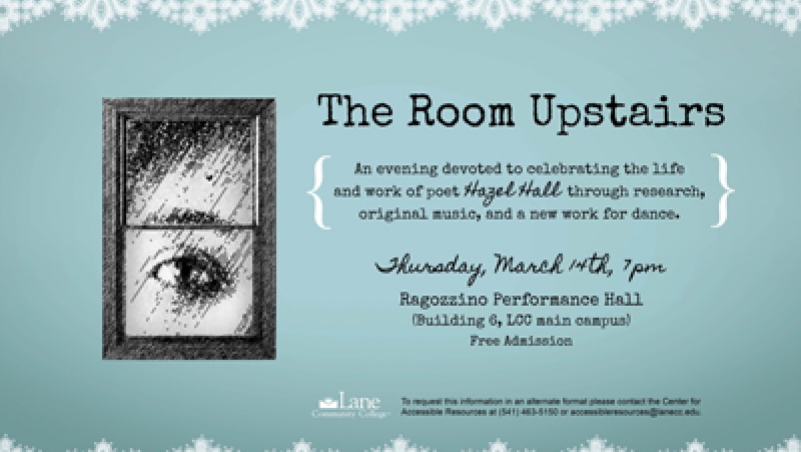
EUGENE, Ore.—“The Room Upstairs: Uncovering the Life and Poetry of Hazel Hall” has been rescheduled to Thursday, March 14 at 7 p.m. in the Ragozzino Performance Hall, Lane Community College main campus, building 6, 4000 E. 30th Ave., Eugene. There is no admission charge.
This special event revives the story of Oregon poet Hazel Hall through a blend of music, dance, lecture, and readings. An exhibit will be available in the lobby. After the show, the collaborators will talk about the evolution of the project. View glimpses into their behind-the-scenes work online.
The presentation reflects the research and compositions of Matt Svoboda, music instructor at Lane. A devotee of poetry who uses words to inspire his music, he hadn’t heard of Hazel Hall until he chanced upon one of her poems in a literary magazine several years ago. “I was immediately taken in by her musical voice, perceptive mind, and unpretentious style,” he says.
Hall was born in 1886 in Saint Paul, Minnesota, and moved with her family to Portland, Oregon as a small child. At age 12, she was paralyzed by scarlet fever or possibly a fall—historical accounts vary. She took in sewing and embroidery to help support her family. She started writing poetry in her 20s but didn’t receive recognition until her 30s. She published two volumes of poetry and a third was published posthumously.
“Hazel Hall was once a critically acclaimed poet with a fascinating story and admiring audience,” Svoboda says, “yet she is relatively unknown today.”
Svoboda’s compositions follow Hall’s three books of poetry. “Curtains” (1921) addresses isolation, sewing and interior spaces and describe what Hall sees and knows such as doors and needlework, stairways and counterpanes. “In this movement, cello is featured because of its connection to sewing, how you move your hands back and forth,” and because of its plaintive nature, says Svoboda.
In “Walkers” (1923), Hall wrote to the people who walked up and down the street below her window. “Here the music picks up tempo and becomes more interactive, with themes being traded between instruments that also shift roles as the music unfolds.”
“Cry of Time” (1928) “is about transcendental themes, mortality, the limits of poetry, and the plight of women,” says Svoboda. “The music for this movement begins in anguish but progressively moves to resolution. The initial theme from ‘Curtains’ returns, but in a transformed state.”
After the performance, Svoboda will be joined on stage with the dancers and other collaborators to talk about the evolution of the project, including Portland visual artist Laura Glazer, LCC technical director James McConkey, DanceAbility choreographer Jana Meszaros, LCC choreographer Sarah Nemecek, and UO poet Geri Doran. The part of Hazel Hall will be danced by Karen Daly who has used a wheelchair after losing a leg to cancer at age 11.
The original music and dance also will be featured in Lane’s annual three-day dance concert, “Collaborations,” March 7-9.
For more information—
- The collaborative process
- “The Room Upstairs: Uncovering the Life and Poetry of Hazel Hall”
- Finding The Room Upstairs: A Visit to Hazel Hall’s Home
For accommodations to attend this event, contact the LCC Center for Accessible Resources at (541) 463-5150 (voice), 711 (relay), or -email AccessibleResources@lanecc.edu.
For more information about Lane Community College:
Lane is an AA/EEO/Veterans/Disabilities Employer
###
Lane Community College educates over 25,000 students annually at six locations across Lane County and online. Students and alumni from all 50 states and 79 countries create more than an $850 million dollar impact on the local economy, helping to support more than 13,000 local jobs. Lane provides affordable, quality, professional technical and college transfer programs; business development and employee training; academic, language and life skills development; and lifelong personal development and enrichment courses.